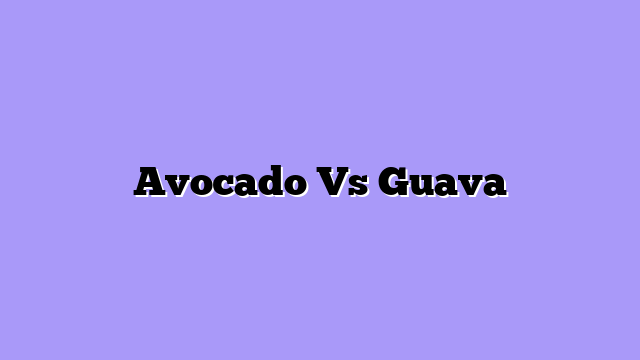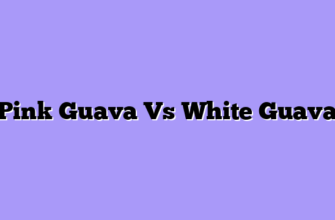You might think I’m crazy for growing both avocados (Persea americana) and guavas (Psidium guajava) on the same farm, but let me tell you – it’s like raising two very different but equally talented children. As someone who’s spent the last 15 years cultivating these fruits, I’ve discovered that while they’re both green and tropical, they’re about as similar as a ballet dancer and a weightlifter!
The Great Growth Game
Let’s start with how these beauties grow. The alligator pear (that’s what some old-timers call avocados) is like that tall, slow-growing friend who takes forever to get ready but always shows up looking perfect. My Hass avocado trees can take up to 5 years before they even think about producing fruit, but boy, are they worth the wait! They’re the gentle giants of my orchard, sometimes reaching heights of 40 feet if I let them (which I don’t – keeping them at 15-20 feet makes harvesting much easier).

Here’s a fascinating comparison of their growth patterns:
| Characteristic | Avocado (Butter Fruit) | Guava (Apple Guava) |
|---|---|---|
| Time to First Fruit | 3-5 years | 2-4 years |
| Maximum Height | 40-60 feet | 20-30 feet |
| Growth Rate | Slow to moderate | Moderate to fast |
| Pruning Needs | Minimal, careful | Regular, tolerant |
Climate and Care Considerations
Now, here’s where things get really interesting. The avocado (or aguacate in Spanish) is like that friend who needs everything just right – not too hot, not too cold, not too wet, not too dry. These prima donnas can’t handle freezing temperatures, and they throw a fit (read: drop all their fruit) if conditions aren’t perfect. I learned this the hard way during my first year when I lost half my crop to an unexpected cold snap.
The apple guava (another common name for Psidium guajava), however, is more like that easy-going friend who can make the best of any situation. While they prefer tropical conditions, they can handle a wider range of temperatures and soil conditions. I’ve seen guava trees bounce back from conditions that would make an avocado tree give up and call it quits.
That said, both trees do share one important trait: they hate wet feet. Good drainage is non-negotiable for both species, though guavas are slightly more forgiving. It’s like they both agree on wearing waterproof boots, but the guava doesn’t mind getting a little muddy sometimes.
The Harvest Hustle
Harvesting these fruits is where the differences really shine. Avocados, our beloved ahuacatl (the Aztec name), are like time-sensitive packages – they need to be picked at just the right moment and will ripen off the tree. It’s a delicate dance of timing and patience, requiring skilled workers who can tell when the fruit is mature but not yet ripe.
Guavas (or peegwah, as my Caribbean friends say) are more straightforward – they ripen on the tree and let you know they’re ready with their intoxicating fragrance. The challenge with guavas isn’t knowing when to pick them; it’s beating the birds to them! I’ve learned to use netting and other deterrents to protect these aromatic treasures.
The harvest seasons are different too. My avocados give me one main harvest season with maybe a few stragglers throughout the year. Guavas, those overachievers, can produce multiple crops annually under the right conditions. It’s like having one child who gives you one big performance a year versus another who puts on several smaller shows throughout the seasons.
Market Dynamics and Profitability
Let’s talk business because, at the end of the day, farming is my livelihood. Avocados have become what I call “green gold” – their popularity seems to know no bounds, especially with the whole avocado toast craze. The butter pear (yet another name for avocados) commands premium prices and has a strong export market.
Guava fruits might not have the same trendy status as avocados, but they have their own loyal following. What’s interesting is how different markets value these fruits differently. My Asian customers go crazy for ripe guavas, while my Latin American clients often buy them slightly underripe for cooking. The versatility of guava is truly remarkable – from fresh eating to processing for jams, juices, and pastries.
Here’s something most people don’t realize: while avocados might bring in more money per pound, guavas often win in terms of total yield per tree. Plus, their faster growth and production cycle means quicker returns on investment. It’s like comparing a high-end restaurant that turns tables once a night to a busy café that serves customers all day long – both can be profitable in their own way.
Looking to the Future
As I walk through my orchard each morning, checking on my green children, I can’t help but feel grateful for the diversity these two species bring to my farm. Climate change is making agricultural predictions trickier than ever, and having both these species feels like having insurance – when one struggles, the other often picks up the slack.
I’m currently experimenting with new varieties of both fruits. There’s a promising dwarf guava variety that could revolutionize small-scale farming, and I’m also trying out some cold-hardy avocado varieties that might extend our growing range. Innovation never stops in farming!
If you’re considering growing either of these fruits, my advice is this: don’t choose between them if you don’t have to. Like a well-balanced portfolio, diversity in farming can be your best friend. Just remember that avocados are your long-term investment that requires patience and precision, while guavas are your reliable performers that keep the cash flow steady.
After all these years, I’ve learned that comparing avocados and guavas is like comparing apples and oranges – they each have their unique strengths and challenges. The key to success isn’t choosing one over the other, but understanding and appreciating what makes each special.








